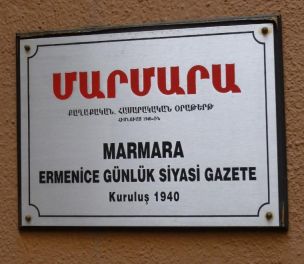Agos Newspaper, available in both Armenian and Turkish, reunited with its readers this week through its 1000th issue.
Danzikyan: Agos uncovered Turkey’s history
Yetvart Danzikyan, Editor-in-Chief of Agos, told bianet:
“When I look at a century before, there was no newspaper who hit 1000th issue. In the past, two million people published a newspaper, now 60,000 people publish it. It is so meaningful and crucial for Armenians to publish 1000th issue of a newspaper with such a great effort.
“We owe this success to Hrant Dink (deceased Turkish-Armenian editor, journalist, columnist, founder and former editor-in-chief of Agos), particularly and workers of newspaper and many who contributed it.
“Throughout history of press in Turkey, a lot of news were reported. However, Agos literally uncovered Turkey’s history and paid a price but gained a seat in history of the Republic of Turkey.
“Agos, revealed many secrets of the country with the management of Hrant Dink and gained a seat in the history of Republic of Turkey with its unique contributions to normalization.”
Named by Rupen Maşoyan, Agos was established on April 5, 1996 by its first editor-in-chief Hrant Dink, Luis Bakar, Harutyun Şeşetyan and Anna Turay. Agos means ‘hole in ground dug in order to plant a seed”, in both Armenian and Turkish.
Hrant Dink was its chief editor from the newspaper's start until his assassination outside of the newspaper's office in Istanbul on January 19, 2007. After Dink was assassinated, Etyen Mahçupyan, Rober Koptaş and Yetvart Danzikyan assumed his position respectively. Agos, Turkey’s first newspaper published in both Turkish and Armenian, included milestones of Agos and Turkey’s history in its 1000th issue. (EA/BD)
Click here to read this article in Turkish
.jpg)
This publication has been produced within the partnership with Osservatorio Balcani e Caucaso for the European Centre for Press and Media Freedom (ECPMF), co-funded by the European Commission. The contents of this publication are the sole responsibility of IPS Communication Foundation and can in no way be taken to reflect the views of the European Union.












.jpg)
.jpg)